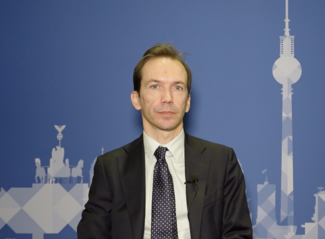TAR-200 Monotherapy Demonstrates Durability of Response in BCG-Unresponsive High-Risk Non-Muscle Invasive Bladder Cancer
Joseph Jacob, MD, Upstate University Hospital, Syracuse, New York, discusses results from cohort 2 of the ongoing phase 2b SunRISe-1 trial which assessed the durability of TAR-200 monotherapy among patients with Bacillus Calmette-Guérin (BCG)–unresponsive high-risk non-muscle invasive bladder cancer. The median duration of response was 25.8 months and 53% of responses lasted ≥ 1 year.
Dr Jacob concluded, “[TAR-200] is safe, it's easy to use, and TAR-200 is under review right now by the FDA following a new drug application.”
These results were first presented at the 2025 American Urological Association (AUA) Annual Meeting in Las Vegas, Nevada.
Transcript:
I am Joe Jacob from Upstate Medical University in Syracuse, New York. I am an associate professor of urology and director of urologic oncology.
I am summarizing the 1-year durability and patient-reported outcomes from the SunRISe-1 trial. This is a trial that includes patients with BCG-unresponsive, high-risk, non-muscle invasive bladder carcinoma with carcinoma in situ. This is a classically very difficult patient population to treat and unfortunately, the standard of care classically has been a radical cystectomy. Radical cystectomy, especially in this patient population, is a life-changing operation with morbidity and also a small mortality rate. There are 3 approved treatment options in this space and these options have been approved in the last few years. There are some options that are becoming available to patients, but we obviously wanted to improve on the outcomes, so we were looking forward to this data this year.I'm presenting cohort 2, which is a TAR-200 monotherapy arm.
TAR-200 is a device that's inserted into the bladder, it's a urinary placement catheter that's placed in the clinic, and this is deployed in the bladder. The device floats in the urine, it stays in the bladder for 3 weeks and it is a device that's designed for sustained release of gemcitabine, so patients can receive gemcitabine for at least 7 days. It's a very different way of treating bladder cancer when you compare it to other intravesical therapies dwell times are around 1 to 2 hours; we have at least 7 days worth of treatment inside the bladder.
These patients received TAR-200 every 3 weeks for the first 24 weeks and then every 12 weeks through week 96. The primary end point was overall complete response rate, and this was determined with cystoscopy every 3 months, central cytology every 3 months, and then mandated bladder biopsies at weeks 24 and 48. Secondary end points were duration of response and overall survival, as well as safety and tolerability, as well as patient-reported quality outcomes.
Overall, 85 patients were enrolled in this TAR-200 monotherapy cohort and the overall complete response rate was 82.4%. This number is important; this is the highest reported complete response rate to date and this we knew, this was very similar to what I presented last year, but this year we were able to see the 12-month durability data. The observed 12-month overall complete response rate was 45.9% and if you look at the duration of response, about 53% of responses lasted for at least 1 year and 47% of those responses remain ongoing, so this looks to be a durable drug. The median duration of response was 25.8 months. The other important thing to think about is that there was an 86.6% cystectomy free rate and rare regression to muscle-invasive disease at approximately 5.7%.
As far as safety goes, this was a safe drug, there were rare serious [adverse events] AEs. About 5 patients had a serious AE and only 3 patients in the entire cohort had discontinued treatment due to treatment-related AEs. The other thing is that there was a 99% insertion success rate, so urologists were good at placing these devices. As far as patient-reported quality of life, there was a global health status and physical functioning questionnaires, and these scores were high at baseline, and they remained stable on treatment.
In summary, the primary end point is the complete response rate at 82.4%, that's the highest reported to date, and that's an exciting number. And not only that, but it is also durable with a duration of response of about 25.8 months and 53% of the responses lasting for at least 1 year. It's safe, it's easy to use, and TAR-200 is under review right now by the FDA following a new drug application.
Source:
Jacobs J, Guerrero-Ramos F, Necchi A, et al. TAR-200 monotherapy in patients with Bacillus Calmette-Guerin-unresponsive high-risk non-muscle invasive bladder cancer carcinoma in situ: 1-year durability and patient-reported outcomes from SunRISe-1. Presented at the AUA Annual Meeting. April 26-29, 2025; Las Vegas, NV.













